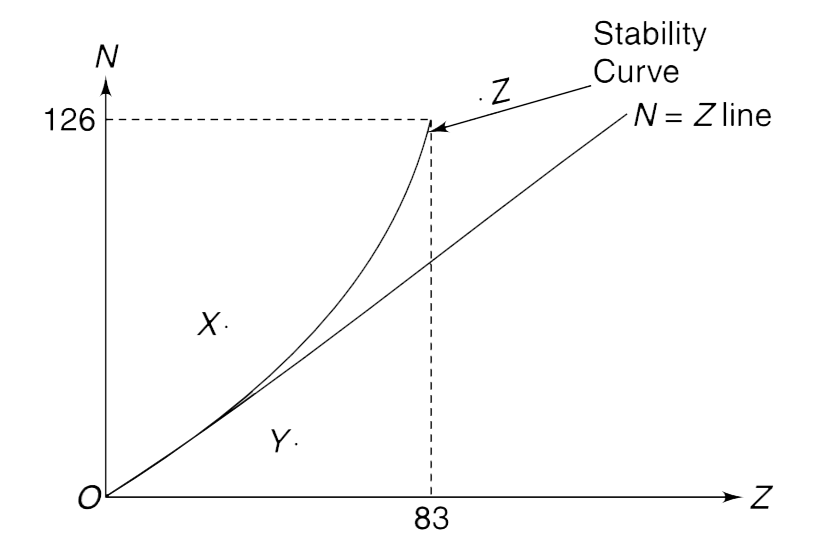Statement : The plot of atomic number ( y -axis ) versus number of neutrons ( x -axis ) for stable nuclei shows a curvature towards x-axis fron the line of 45∘ slope as the atomic number is increased .
Explanation : proton -proton electrostatic repulsions begin to overcome attracive forces involving protons and neutrons in heavier nuclides.
Statement 1 is true, statement 2 is true, statement 2 is correct explanation for statement 1.
Statement 1 is true, statement 2 is true, statement 2 is not a correct explanation for statement 1.
Statement 1 is true, statement 2 is false
Statement 1 is false, statement 2 is true
The correct Answer is:A
Step by step video, text & image solution for Statement : The plot of atomic number ( y -axis ) versus number of neutrons ( x -axis ) for stable nuclei shows a curvature towards x-axis fron the line of 45^@ slope as the atomic number is increased . Explanation : proton -proton electrostatic repulsions begin to overcome attracive forces involving protons and neutrons in heavier nuclides. by Chemistry experts to help you in doubts & scoring excellent marks in Class 12 exams.
Updated on:21/07/2023Topper's Solved these Questions
Similar Questions
The figure shows a plot of number of neutron (N) versus number of protons (z) in all stable nuclei found in nature. What kind of decay are nuclei X,Y and Z expected to show?

View SolutionStatement 1 : Proton -proton electrostatic repulsions begin to overcome attractive forces involving protons and neutrons in heavier nuclides
Statement 2 : The plot of atomic number (y-axis) veruse number of neutrons (x-axis) for stable nuclei shows a curvature towards x-axis from the line of 45∘ slope as the atomic number is increased.
View Solution
Knowledge Check
Statement-1: Th plot of atomic number (y-axis) versus number of neutrons (x-axis) for stable nuclei shows a curvature towards x-axis from the line of 45∘C slope as the atomic number is increased.
Statement-2: Proton-proton electrostatic repulsions begin to overcome attractive forces involving protons and neutrons in heavier nuclides.AStatement-1 is True, statement-2 is True, Statement-2 is a correct explantion for Statement-1.BStatement-1 is True, Statement-2 is True, Statement-2 is NOT a correct explanation for Statement-1CStatement-1 is True, Statement-2 is False.DStatement-1 is False, Statement-2 is True.Statement : The plot of atomic number ( y -axis ) versus number of neutrons ( x -axis ) for stable nuclei shows a curvature towards x-axis fron the line of 45∘ slope as the atomic number is increased .
Explanation : proton -proton electrostatic repulsions begin to overcome attracive forces involving protons and neutrons in heavier nuclides.AStatement 1 is true, statement 2 is true, statement 2 is correct explanation for statement 1.BStatement 1 is true, statement 2 is true, statement 2 is not a correct explanation for statement 1.CStatement 1 is true, statement 2 is falseDStatement 1 is false, statement 2 is trueStatement : The plot of atomic number ( y -axis ) versus number of neutrons ( x -axis ) for stable nuclei shows a curvature towards x-axis fron the line of 45∘ slope as the atomic number is increased .
Explanation : proton -proton electrostatic repulsions begin to overcome attracive forces involving protons and neutrons in heavier nuclides.AIf both Statement-I & Statement -II are True & the Statement -II is a correct explanation of the Statement -I.BIf both Statement -I & Statement -II are True but Statement-II is not a correct explanation of the Statement-I.CIf Statement-I is True but the Statement -II is False.DIf Statement-I is False but the Statement -II is True.
The nucleus of an atom is made up of X protons and Y neutrons. For the most stable and abundant nuclei
View SolutionA plot of the number of neutrons (n) against the number of protons (p) of stable nuclei exhibits upward deviation from linearity for atomic number, Z>20. For an unstable nucleus having n/p ratio less than 1, the possible mode (s) of decay is (are)
View SolutionA plot of the number of neutrons (n) against the number of protons (p) of stable nuclei exhibits upward deviation from linearity for atomic number, Z > 20. For an unstable nucleus having n, p ratio less than 1, the possible mode(s) of decay is(are)
View SolutionA plot of the number of neutrons (n) against the number of protons (p) of stable nuclei exhibits upward deviation from linearity for atomic number, Z>20. For an unstable nucleus having n/p ratio less than 1, the possible mode (s) of decay is (are)
View SolutionA plot of the number of neutrons (n) against the number of protons (p) of stable nuclei exhibits upward deviation from linearity for atomic number, Z>20. For an unstable nucleus having n/p ratio less than 1, the possible mode (s) of decay is (are)
View Solution
